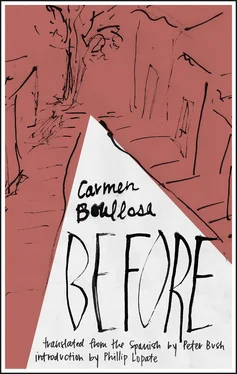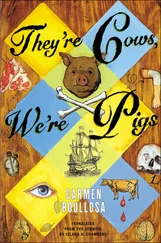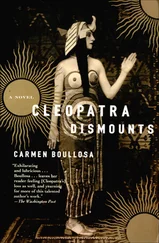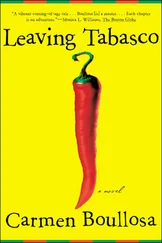Carmen Boullosa - Before
Здесь есть возможность читать онлайн «Carmen Boullosa - Before» весь текст электронной книги совершенно бесплатно (целиком полную версию без сокращений). В некоторых случаях можно слушать аудио, скачать через торрент в формате fb2 и присутствует краткое содержание. Год выпуска: 2016, Издательство: Deep Vellum Publishing, Жанр: Старинная литература, на английском языке. Описание произведения, (предисловие) а так же отзывы посетителей доступны на портале библиотеки ЛибКат.
- Название:Before
- Автор:
- Издательство:Deep Vellum Publishing
- Жанр:
- Год:2016
- ISBN:нет данных
- Рейтинг книги:4 / 5. Голосов: 1
-
Избранное:Добавить в избранное
- Отзывы:
-
Ваша оценка:
- 80
- 1
- 2
- 3
- 4
- 5
Before: краткое содержание, описание и аннотация
Предлагаем к чтению аннотацию, описание, краткое содержание или предисловие (зависит от того, что написал сам автор книги «Before»). Если вы не нашли необходимую информацию о книге — напишите в комментариях, мы постараемся отыскать её.
Part bildungsroman, part ghost story, part revenge novel,
tells the story of a woman who returns to the landscape of her childhood to overcome the fear that held her captive as a girl. This powerful exploration of the path to womanhood and lost innocence won Mexico's two most prestigious literary prizes.
Carmen Boullosa
Texas: The Great Theft
Before — читать онлайн бесплатно полную книгу (весь текст) целиком
Ниже представлен текст книги, разбитый по страницам. Система сохранения места последней прочитанной страницы, позволяет с удобством читать онлайн бесплатно книгу «Before», без необходимости каждый раз заново искать на чём Вы остановились. Поставьте закладку, и сможете в любой момент перейти на страницу, на которой закончили чтение.
Интервал:
Закладка:
As soon as I got home I inspected them slowly: in effect, the paper showed no sign it had been drawn on; the pebbles were like the previous ones, as if the wardrobe had read the intention behind my drawings and ignored my clumsy squiggles. I thanked its generosity. Only the biggest stone, the one I’d painted by itself on a single sheet, was more opaque, not at all translucent and, no doubt, too white. I told myself that the wardrobe had also used it as a trial run, and put it away in the drawer where I kept my erasers, pencil sharpeners, dry leaves, packets of jelly, treasures I cherished but never dared to share with anyone, except, naturally, my two sisters.
Before going to sleep, when they switched off the light and thought I was well away, I placed the rest of the pebbles around my bed. I fell asleep very peacefully, it was true, undisturbed by the usual sounds of that time of night. Soon after the steps, the familiar sounds woke me up, which I greeted more startled than ever, principally because I had complete faith in the protective circle of white pebbles, they would cut me off from them, never thinking for a moment that wouldn’t happen; and second because I felt I hadn’t slept : I had dreamed nothing, nothing. From the moment I shut my eyes to the moment I reopened them, nothing passed before them: the film of my dreams had been wiped.
I never dreamed again. The steps kept resounding, perhaps more clearly, certainly hit a more fragile, more visible target; even asleep, I had no place to hide. Who had shut the doors? It was then I understood things aren’t always what they seem, that it would be easy to recover what one sees, yet impossible to recover it in all its substance.
I never again arranged the pebbles around my bed. Superstitiously, I resolved to collect them up in the morning and I gradually got rid of them one at a time, in a place from which I thought they’d never come back to haunt me. “Things aren’t what they seem.” Not always. You will understand I never returned to the wardrobe — if things within the order of their own creation rebelled and enemies found (if they existed) levers of support in there to bolster them or provide stations for what I initially called persecution, what would happen with things I’d provoked into existence? Just imagine! They’d already deprived me of my dreams, delivered me to the night, scalped, with fear my only shelter. What would other objects be capable of? I mean the things provoked, dragged by my willpower out of the nothingness that engulfed them.
And so if I was the only one who, by chance, had discovered the potential of the beautiful, carved wooden wardrobe, I kept the secret to myself.
It didn’t take any effort.
11
“Malena! Fina!” I ran into the house, shouting to them. “Malena! Fina!” “That’s strange,” I thought, “odd they’re not answering.” They were so loving and attentive toward me. “Malena! Fina!” I asked Inés, and she just shrugged her shoulders. I asked Salustia: she stopped ironing, wet the iron again, waved a damp finger, and said, silencing the noise of the iron’s contact with the water, “They’re in their bedroom.”
I ran to their room. By now I’d forgotten what I wanted to show or tell them but I kept calling out. “Malena! Fina!” Couldn’t they hear me? I reached their room: the door was shut. I tried to turn the doorknob, it was locked by the button you could press inside the room (something implicitly forbidden, nobody locked their door). I hammered on the door with my fist. “Coming,” the two chorused. Their voices sounded different. What was this “ Coming ”? They’d never used that tone with me.
“ Coming ,” they said, but didn’t open the door. I started to hop around in circles, even forgot what I was doing there, but the closed door reminded me. I knocked again, they didn’t answer. I sat down on the wooden trunk that had always been next to their door. I could hear them talking in the distance, whispering. I heard them say words I couldn’t catch, that, for the first time, they kept out of my range. They talked and talked. Laughed. Walked from one side of the room to another, and every one of their actions underlined the one they were avoiding: letting me in.
Annoyed, I lifted the lid to the trunk. It was full of handwritten and painted notebooks, embroidered in Esther’s warm hand and the drawings and paintings we’d always known from her. A small nail (like the one I’d painted) was in the center of a white sheet with no commentary. I put them back after reading a couple of lines I didn’t understand. I tidied them and shut the trunk. Then (at last!) my sisters opened the door, silently observed me from a room that was no longer familiar, owners of a new complicity that had erased me, that had no room for me. On the bed lay an object that (more resistant than a lock, stronger than a chain, higher than the highest wall) had succeeded in separating me from my two sisters: a white object, folded in four, displayed on the quilt, which needed only candles to emphasize the sudden veneration my sisters felt for it. I asked them (in pure gaucherie), “What’s the matter? Why wouldn’t you let me in?” and they laughed between gritted teeth, looked at each other, making me feel totally unimportant. I caught another glimpse of the white intruder on the bed, noticed the straps and metal clasps. “What’s that?” I asked. They ignored me as before, or, rather, (why lie, this is the truth), mimicked my voice, and mocked my awkward question. My hand closed in on the white enemy. “Don’t touch,” “It’s not for children, it’s for señoritas .” I took a closer look: yes, I knew what it was, it was a bra like Esther’s, I had seen them in the laundry room. But how did you wear them?
That was the end of our afternoons together, and I couldn’t understand why. One night, a few days after, I went into their room as usual: Malena, not noticing my presence, was pulling on a nylon stocking as she stroked her leg, touching it like the statue of a saint, acting as if it were the leg of a señorita . Suddenly she saw me watching her: “What are you doing here? Go out and knock on the door before you come in.” I turned around and rushed to shed some tears on my pillow, though warm (the grief springs from that temperature), icy in relation to the pain. I cried over the lack of attention from the two fairy godmothers who had protected the threshold of my being, had prevented monsters coming in from the outside, not realizing that what I should have been mourning was the disappearance of the girls who once had been my sisters.
A few days later we went camping with the guides, the female equivalent of the scouts (boy explorers) founded by a gentleman by the name of Baden Powell, a hero similar to Chabelo in my girlish eyes who dressed as a boy (in the organization’s manual illustrations he came dressed in bermudas, neckerchief, and ridiculous hat, a similar outfit to the boy scouts), and who inspired courage in us during the nights in camp, nights when we went to sleep in the countryside and fought off what they wanted to be our routines and talents in childhood: from cleaning our teeth and washing to obeying our parents, sitting ( comme il faut ) in uncomfortable chairs, in uncomfortable armchairs, eating at uncomfortable tables, sleeping between uncomfortable sheets…We let our bodies enjoy the fresh air, in our view in total disarray and, according to our organizers’ criteria, following the framework of a formative discipline, which fortunately none of us could feel.
This time we camped without tents on a farm. We stayed in empty, luminous galleries. My sisters avoided my company. I stayed at the back and saw them enter the next gallery, with a narrow, communicating door. I spread around the dry pine branches piled about to cushion my sleep and put my sleeping bag down next to nobody in the middle of the cement floor. I put down my sea-blue backpack as a pillow and when I raised my eyes saddened by a sisterly rejection that I now believed to be definitive I saw I was surrounded by an infinity of sleeping bags: there were no cement spaces in the gallery not carpeted by girls and their respective packs in orderly rows and a disorderly trail of dry pine branches that brigades of older girls swept up.
Читать дальшеИнтервал:
Закладка:
Похожие книги на «Before»
Представляем Вашему вниманию похожие книги на «Before» списком для выбора. Мы отобрали схожую по названию и смыслу литературу в надежде предоставить читателям больше вариантов отыскать новые, интересные, ещё непрочитанные произведения.
Обсуждение, отзывы о книге «Before» и просто собственные мнения читателей. Оставьте ваши комментарии, напишите, что Вы думаете о произведении, его смысле или главных героях. Укажите что конкретно понравилось, а что нет, и почему Вы так считаете.












